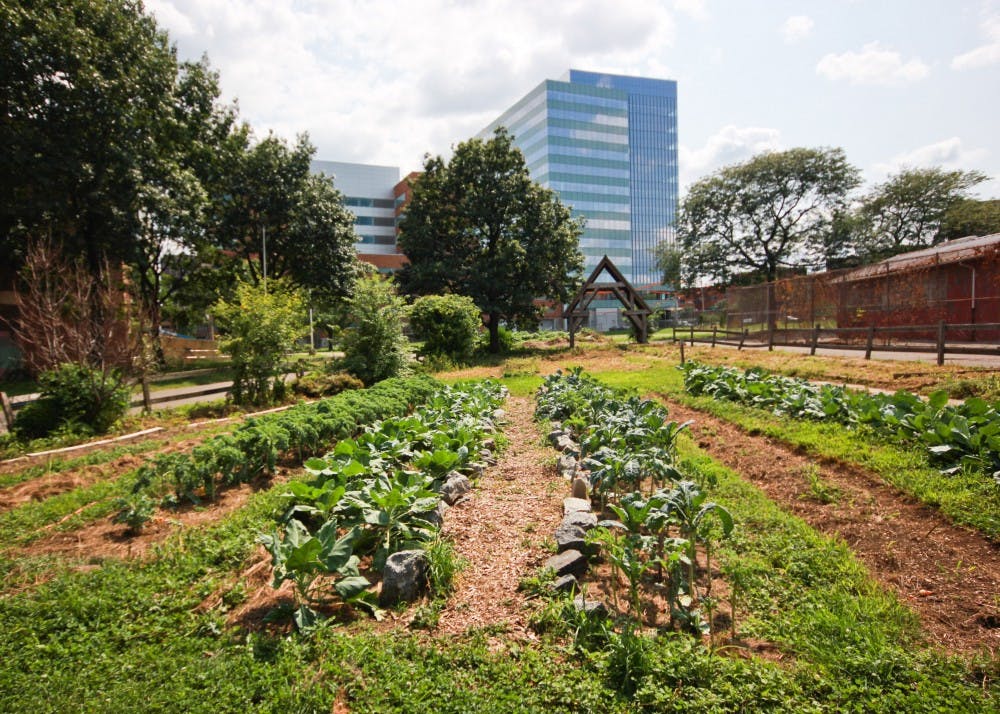Members of the Penn and West Philadelphia community are fighting to preserve the University City High School Garden.
The garden, which is located near the intersection of 36th and Warren streets, was founded in 2000, and has been described as the spirit of the “Black Bottom Community”, according to a recent Drexel press release.
Drexel purchased the abandoned site in partnership with Wexford Science & Technology and plans to transform the site with a potential elementary school as well as residential, retail and office space. Although some reports indicate that Drexel has plans to transform the garden into a parking lot, a spokesperson said that the University has no such intention.
The garden produces about two tons of fruits and vegetables each year. Ten percent of the yield is donated to local communities and 25 percent is sold to low-income Philadelphians. It also provided education for local elementary schools and hundreds of part-time jobs for high-school students.
The site also houses the University City High School and Drew School buildings, which Drexel plans to redevelop in a process that will feature environmental remediation of the entire site, including the Penn Agatston Urban Nutrition Initiative garden, Drexel Senior Vice President of University Communications Lori Doyle said in an email.
Doyle said that it will no longer be safe to have a garden on site during the remediation.
The garden has stood as a source of pride for the children and grandchildren of the community members who were affected by university expansion in the late 1960s. Now, members of this community believe they are experiencing the same lack of respect as they have in the past.
One year after the 2013 closing of the University City High School, Councilwoman Jannie Blackwell approved a bill that allowed Drexel University to purchase the 14-acre area for more than $25 million. Blackwell has also enabled major zoning changes to the area, putting the fate of the UCHS garden into question.
The Powelton Village Civic Association has proposed alternatives to preserving the legacy of the garden. “PVCA is advocating for keeping the garden in place for as long as that would be possible amidst construction and demolition on the site or finding an alternative site so that the wonderful work the student gardeners do can continue,” PVCA President John Phillips said.
2011 College graduate Lan Dinh, who expression frustrated towards the proposal for a relocation of the garden, has worked at the garden through a work-study position in the Urban Nutrition Initiative since 2008.
“A garden is the joining of land and people in a symbiotic relationship,” argued Dinh. “The idea that the garden can simply be relocated does not allow for an understanding of the history, culture and relationship power that goes into making a garden.”
Many University City High School and Penn students believe they have had little input in this matter. Co-founder of the garden and faculty member of the Urban Nutrition Initiative at Penn, Danny Gerber, was angered by how Drexel addressed the garden conflict and expressed his disapproval of Drexel’s closing of the garden without community input.
“Drexel has been very disrespectful in how they’ve handled the garden,” Gerber said. “They claim that it is a huge part of the Black Bottom community, but then they say it will be impossible to keep. It doesn’t make sense.”
Yet Phillips of the PVCA claims that no one from the garden attended any of the several open community planning meetings that were held in May and June. “So the garden, while vital in all the ways we know, was not specifically noted in the hectic atmosphere surrounding the passage of the UCHS Bill in Council,” he said.
Dinh has written a letter to Penn President Amy Gutmann — which collected over 160 signatures — hoping that Gutmann will advocate to keep the garden where it is. Gerber has also started a Facebook group called “UCHS Garden is Sacred, Parking Lots are Not!” which has acquired over 850 members.
Doyle reported that plans for the former school parcel are still being developed, though they do not include replacing the garden with a parking lot. A community advisory group will work with Drexel and Wexford throughout the site planning process.
"This will be the appropriate forum to consider ways to continue to honor the Black Bottom, and the legacy of this garden," Doyle said in an email.
As of today, Drexel has told the garden team that they need to evacuate the space before the beginning of September.
A previous version of this article reported that Drexel plans to turn the garden into a parking lot. According to a Drexel spokesperson, they have no plans to do so. The DP regrets the error.



